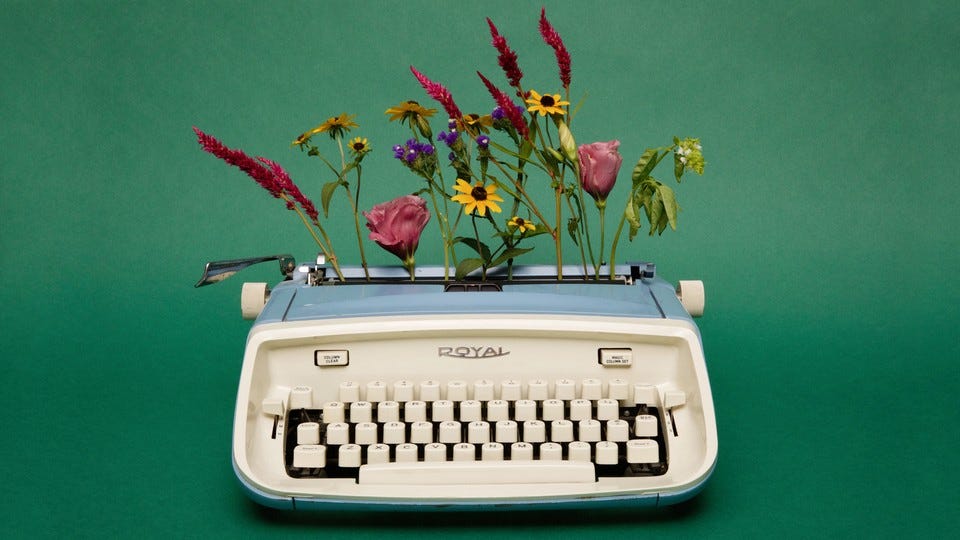Slipping ... with Lidia Yuknavitch
Reframing stories and shifting shapes to claim and reclaim yourself
Sometimes a single word can open a doorway into another’s sensibility, and perhaps even provide a view of their soul.
The word I’ve focused on with Lidia Yuknavitch is the word “slippage.” She used it beautifully in a blurb she wrote for my collection of short stories, All the Comfort Sin Can Provide:
… Really, at the heart of all identity is the reach for pleasure, and then what actually comes, all those moments of slippage where we do the wrong thing, take a ridiculous risk, double down on failure, land in a forsaken place, slip the mainstream of things enough to change and become. These characters exude beauty from their flaws. These stories are lit.
Of all of the words in this wonderful blurb, I loved the word “slippage” the most because it was such a different word—one I’d never heard before, actually—and because the word perfectly captured my stories, all of my writing, in fact.
I recently read Lidia’s new memoir, Reading the Waves, and I noticed that she used “slippage” often in it, so I wondered what the word meant to her existentially—as a window into her view of life. I asked her this question when she appeared on my podcast.
“I neither believe anyone is as heroic as we want to pretend they are, nor are our mistakes as horrific as we tend to believe they are, even when they are terrible,” she said. “The word slippage carries with it this idea that it was a fraction, it was a moment. Everything was going one way and then a small turn happened.”
Life’s drama resides in that small turn …
She joked that slippage also describes herself on land: “If you dip me in water I become as agile as a seal. But in regular life, I'm the person with one hundred bruises. I'm going to hit my knee on the desk when I get up, and I'm going to hit my shoulder on the door on the way out.”
I tend to drop and spill things as well—but I’m a good catch, I joke. When I was born, the nurses called me Mr. Magoo because my eyes were swollen shut, and I’ve always appreciated Mr. Magoo as a metaphor for myself: I go through the world, sometimes inadvertently driving off cliffs, but somehow I generally land safely and don’t hurt anyone. I catch the plate I drop.
The question is, though, when will I not catch the plate? Or … have I grown too comfortable in my ability to catch things as they fall. Should I be more careful? I wrote a story about this, “Mr. American,” which I think might be my best story (it’s in All the Comfort Sin Can Provide).
Catching falling objects
One way that Lidia catches falling objects is through her powers of storytelling. She goes back to the pains she’s carried in her body for years and then “re-stories” them.
“How do any of us lay down the stories of our past selves and what we have carried for far too long?” she asks.
We’ve made up the stories of our lives, after all. Things have happened to us, but we’ve also happened to things. “Memories are conjurings,” she says. Which means they can be re-conjured.
In fact, one interesting thing about our memories is how memory relies on similar parts of the brain as the imagination. Our memories, in other words, don’t live in a mental library as exact records; we essentially rewrite our memories in some way each time we remember them. Our world, our perceptions, are fictional to a degree by definition.
Anything that can be put to story can be storied differently.
I know that one of the interesting things about writing my own memoir is how my story is changing literally as I write it. We’re constantly creating ourselves.
Lidia does this most specifically with her ex-husband Devin, who either fell or jumped to his death. Her current husband hired a private detective years later to find the details of his death, and he gives her what he finds.
Her task is to essentially save Devin’s life, or her version of it, from the way it’s been documented in his obituary and police report. She writes, “I want to revision his story away from that idiotic obituary, away from the accident report and autopsy. I want to write him back to life, even if it kills me, an impossible story. Or I want to write open a space where what he loved lives, which in the end, was not me, even if it was, briefly. I understand now that love is always the fall.”
Love is always the fall. So much of Reading the Waves is about love, but also about the seemingly inevitable fall. The fall can eclipse the love so easily, so disturbingly, and yet we’re not passive beings—we can re-read our lives.
She asks, “ What if we could stand in different relation to our experiences? Could the stories we carry about our experiences … loosen? Fall away and become sediment? Rearrange themselves? Change form? Could I read my own past the way I read the books I love, with the same compassion, irritation, resistance, desire, playful transgression, erotics, joy, curiosity, and wonder that I bring to the books I love.”
Shapeshifting
In writing about Devin, shapes shift. She’s able to release the story she’s carried for so long and breathe through another one.
“Anything that can be put to story can be storied differently,” she writes.
In fact, another favorite word of Lidia’s is “shapeshifting.” When we “story” differently we literally change shapes. Changing shapes is a matter of survival. I think it’s interesting because the “re” prefix means repetition or return, but it also means renewal, and in re-reading the waves of her life, she finds renewal.
She wends through her memories of their intense drunken times together—drunk on liquor and drunk on love—and she re-captures Devin’s life, lifting him up from his fall, in effect. Each love, no matter how badly it ends, holds a treasure, she reminds us.
“The love stories you enter are always living and dying, and in that motion the love stories carry something stunning, some treasure that you will make use of the rest of your life. Our broken hearts are what we give each other so that we may endure: shared sorrow is also the seed of joy.”
And there it is, one of the most important purposes of why we write: to share our broken hearts so that we may endure.
Writing to the intensities
I initially bonded with Lidia during a previous appearance on the podcast, when we each talked about our difficulties with traditional plot structures. There is a tyranny of plot that most writers learn through Joseph Campbell’s “The Hero’s Journey” or the escalating triangle of structure known as “Freytag’s Pyramid.”
Each of those are perfectly good ways to tell a story, but they haven’t truly worked for me—yet I thought for years that I had to write that way. Lidia confessed much the same, until she discovered Nathalie Sarraute’s Tropisms, a favorite book of mine as well. Tropisms is about the tiny pivots of life, the almost imperceptible movements that most of us live within.
Lidia calls them “intensities,” a word that resonates perfectly with me as a way to write a story. Intensities are the micro movements in life, the “non-events,” as she puts it.
I read an interview she did with Cheryl Strayed recently, and she said:
“I am certainly drawn to art and writing by people—living and dead—that zooms in on this smaller world. For example, Willem de Kooning’s idea that content is in fact tiny, not dramatic or large, or Virginia Woolf talking about ‘little daily miracles’ or ‘moments of being.’
… Part of what Woolf was doing, so ahead of her time, was capturing those moments of being, of aliveness, of intensities, for whatever reason she was called to self-express, but certainly to bear witness to experience.”
Lidia is a truth-teller by definition, and she even notes how she’s a “malformation junkie”—she loves form but hates forms that are conventional, well-received, or traditional and pleasing.
She writes “I love the monster,” and this book is definitely hard-hitting. She reveals herself in so many ways, through stories of love affairs, sexual encounters, physical abuse, marriage, parenthood, and substance abuse. One thing that’s interesting is that many of the memories that she detailed in her 2011 memoir, The Chronology of Water, are reconfigured, re-shaped by time passing.
She writes, ““Being, like imagination, is trans. It moves. Across. Beyond. Through. Change. Shapeshifting. Interbeing. Interspecies.”
Read
’s Reading the Waves, and think of how to re-write, revision, re-story the stories you’ve carried with you for years.Please become a paid subscriber to this newsletter …
Because love is confusing
“But love still confuses me. Love stories. Some of them descend, some of them ascend, some are suspended at least briefly as if they might fly, others plateau like a sentence that can’t find punctuation or worth. Or explode.”
—Lidia Yuknavitch
Because you need to love anyway
Per the inevitable fall of love, Lidia quotes Mark Doty, who captures the intimate space between love and death in What Is the Grass.
“You need to both remember where love leads and love anyway; you can both see the end of desire and be consumed by it all at once. The ecstatic’s body’s a place to feel timelessness and to hear, ear held close to the chest of another, the wind that blows in there, hurrying us ahead and away, and to understand that this awareness does not put an end to longing but lends to it a shadow that is, in the late hour, beautiful.”
Listen to Lidia Yuknavitch!
I’m available for book coaching and editing!
I have some space on my Writing Consult calendar if you’re looking for help.
I help people develop books and projects from scratch and sometimes do larger edits on finished manuscripts.
I've worked on novels, memoirs, and short story projects. I’ve also worked on helping people figure out what kind of writer they want to be.
Contact me to find out more about my one-on-one work with writers.
Because a photo
Sometimes in this unfair, disturbing world, I like to just look at flowers. I can’t get enough flowers these days. They go well with birds chirping. They go well with a reminder of what life is about. They go well with hope.









One thing that just occurred to me, which I wish I would have included in this piece, is that Lidia's use of the word "slippage" is a forgiving word. It's a moment, perhaps a misguided moment, but not a moment meant to be cruel or harmful. She says as much when she says, “I neither believe anyone is as heroic as we want to pretend they are, nor are our mistakes as horrific as we tend to believe they are, even when they are terrible." I like that the word holds this forgiveness, this openness.
"I know that one of the interesting things about writing my own memoir is how my story is changing literally as I write it. We’re constantly creating ourselves." I love this, Grant. Memoir writing IS shape-shifting. The self that sits down to begin writing the memoir is not the self that stands up in the end. What mysterious beauty is this?